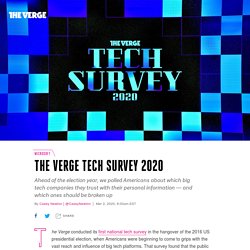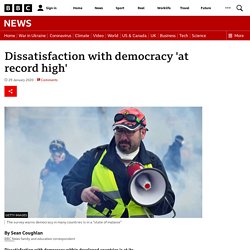

Can Social-Emotional Skills Strengthen Democracy? We live in a democracy, but many Americans do not vote.

Turnout in presidential election years hovers around 60 percent, and it can be much lower otherwise. What’s going on? Perhaps many voters do not feel informed enough to make decisions. How Do Your Morals Shape Your Politics? Today is Super Tuesday, 2020, when voters in 14 states and one U.S. territory will decide who will represent the Democratic Party in the race against the current president.

One issue has dominated the primary debates: Why is wealth and power so skewed in America, and what can we do about it? The Verge Tech Survey 2020: how people feel about Apple, Google, Facebook, and more. TheThe Verge conducted its first national tech survey in the hangover of the 2016 US presidential election, when Americans were beginning to come to grips with the vast reach and influence of big tech platforms.

That survey found that the public was increasingly skeptical of Facebook but was still reliant on it, saying they would miss the company’s products if they disappeared. Amazon, on the other hand, remained deeply popular with the American people: a majority of those surveyed said they “greatly liked it.” Two and a half years later, in the lead-up to another presidential election, those trends have accelerated. A bigger proportion of the population holds a highly favorable view of Amazon, while more people have a very unfavorable view of Facebook than they did in 2016. More importantly, Americans generally believe the biggest tech companies have too much power and ought to be split up. The news for tech companies isn’t all bad.
Special thanks to Rani Molla. What Jeff Bezos can buy with his climate war chest. In Cixin Liu's epic science fiction novel The Dark Forest, human civilisation is given 400 years to prepare for the arrival of hostile aliens who hope to conquer us.

A new world government bans "escapism" – the notion of leaving Earth behind to find a new home elsewhere – so as to ensure humanity's total commitment to the coming "doomsday battle". Just so, the People's Global Committee for the Salvation of the Earth will surely be pleased that Jeff Bezos, chief executive of Amazon and world's richest human, has decided to devote his resources to saving the planet where he actually lives.
In 2018, he said that colonising space was the "only way that [he could] see" to spend his $130bn (£100bn) net worth; now he has pledged $10bn to fight climate change. But what does $10bn actually buy you? You Don’t Want Hygge. You Want Social Democracy. It’s the holidays, and you long to be cozy.

You want to curl up in a plush armchair next to a crackling fire. Elizabeth Lesser: Take "the Other" to lunch. Scientists Are Beginning to Figure Out Why Conservatives Are…Conservative. Scientists are using eye-tracking devices to detect automatic response differences between liberals and conservatives.University of Nebraska-Lincoln You could be forgiven for not having browsed yet through the latest issue of the journal Behavioral and Brain Sciences.

If you care about politics, though, you'll find a punchline therein that is pretty extraordinary. Click here to read more from Mooney on the science of why people don't believe in science. Behavioral and Brain Sciences employs a rather unique practice called "Open Peer Commentary": An article of major significance is published, a large number of fellow scholars comment on it, and then the original author responds to all of them. 'Alberta has been cheated': Wexit supporters on what drives them.
On election night in 2019, Saskatchewan, Alberta and interior British Columbia were swept by a sea of blue, with voters overwhelmingly eager for a change in command that would see the ousting of Justin Trudeau as prime minister, and his replacement by Conservative leader Andrew Scheer.

Enough was enough, Conservative voters said, of a Liberal government in Ottawa that seemed oblivious to the concerns and real economic hardships of westerners. But a strong showing for the Liberals in Atlantic Canada and the Greater Toronto Area, coupled with a resurgence of the Bloc in Quebec, meant that, for many western Canadians, the election was once again decided before the count reached the Ontario-Manitoba border.
The fact that Conservatives won a majority of the votes in Canada but still lost added insult to injury. You Don’t Want Hygge. You Want Social Democracy. Dissatisfaction with democracy 'at record high' Image copyright Getty Images Dissatisfaction with democracy within developed countries is at its highest level in almost 25 years, according to University of Cambridge researchers.

Academics have analysed what they say is the biggest global dataset on attitudes towards democracy, based on four million people in 3,500 surveys. The UK and the United States had particularly high levels of discontent. "Across the globe, democracy is in a state of malaise," report author Roberto Foa said. The study, from the University of Cambridge's Centre for the Future of Democracy, has tracked views on democracy since 1995 - with the figures for 2019 showing the proportion dissatisfied rising from 48% to 58%, the highest recorded level.